Convenience is no longer the differentiator, that’s the foundation. Telehealth spells convenience and has become an integral part of modern therapy. Now therapists can reach out to clients with greater flexibility, accessibility, and efficiency.
As the demand for remote health support grows (including mental health), choosing an apt telehealth platform is key for professionals aiming to ace client care. From solo practitioners to large clinics, therapists now rely on these tools for secure, compliant, and impeccable virtual sessions.
Our blog explores the nuances of telehealth platforms and dismantles the top 3 platforms in the market — Doxy.me, BetterHelp, and Theranest. We bring you a detailed comparison of their features, pricing, and support to help you decide which one fits your practice the best.
TL;DR
Key Takeaways:
- Telehealth is essential for modern therapy, offering flexibility, accessibility, and efficiency.
- Top platforms compared:
- Doxy.me – Simple, browser-based, HIPAA-compliant, free tier available.
- BetterHelp – Handles client matching & admin work, ideal for therapists wanting no marketing hassle.
- TheraNest – All-in-one solution with EHR, billing, and telehealth for group practices.
Must-Have Features:
✔ Security & Compliance – HIPAA-compliant encryption, secure data handling.
✔ User-Friendly Interface – Easy for therapists & clients.
✔ Integration – Syncs with EHR, billing, calendars.
Choosing the Right Platform:
- Solo practitioners → Doxy.me (affordable, simple).
- Therapists wanting clients handled → BetterHelp.
- Group practices → TheraNest (scalable, full-featured).
Final Tip: Test platforms with free trials & gather client feedback before committing.
Understanding Telehealth Platforms For Therapists
What are Telehealth Platforms?
Telehealth platforms for therapists are secure, digital systems that deliver healthcare services remotely using communication technologies such as video conferencing, instant messaging, mobile apps, and online portals.
In the realm of mental health and therapy, these platforms enable counsellors, licensed therapists, psychologists, and other mental health professionals to conduct sessions with clients bypassing in-person visits.
Telehealth platforms typically include:
- Video conferencing tools for live therapy sessions.
- Scheduling and calendar integration for appointment management.
- Secure messaging for follow-up or other vital communications.
- Electronic health record (EHR) systems for storing patient information and session notes.
- Billing and insurance integration to handle payments and reimbursements.
These platforms must comply with healthcare privacy regulations such as HIPAA (Health Insurance Portability and Accountability Act) in the U.S. to ensure client data is secure, safe and confidential.
In modern therapy, telehealth platforms have garnered a critical role by:
- Expanding access to care, especially for clients in remote or underserved areas.
- Facilitating continuity of care, even when clients or therapists are traveling or are too far away to avail treatment.
- Modernizing therapeutic practices through digital record-keeping, reminders, and analytics.
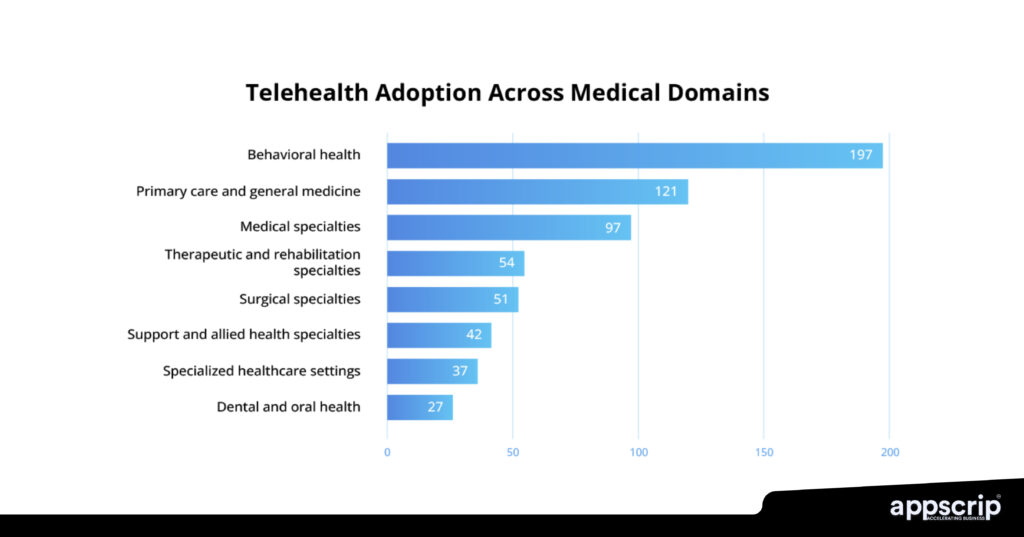
Benefits for Therapists
The influx of telehealth platforms has provided therapists a wide range of benefits making their practices more efficient, flexible, and client-centered. Here are the key advantages:
1. Enhanced Accessibility
- Clients in rural or remote areas without local mental health services can be rest assured that therapists can now reach out to them.
- Mobility issues, chronic illness, or busy schedules can be overcome as access to therapy is possible from the confines of home or work.
- The possibility of virtual treatment makes it possible for therapists to expand their availability without needing a brick and mortar option.
2. Improved Efficiency
- Integrated tools combine scheduling, documentation, billing, and client communications in one place.
- No-shows are down and session attendance gain ground with the help of automated reminders.
- Digital intake forms and client notes save administrative time and reduce paperwork.
3. Increased Client Satisfaction
- Convenience is a best seller, clients appreciate the hassle free service and the privacy involved in attending sessions at their leisure.
- With clients able to attend even while traveling or during illness, there’s consistent engagement ensuring satisfaction.
- There’s major improvement in therapeutic outcomes as clients feel more comfortable sharing information from familiar surroundings.
4. Scalability and Flexibility
- There are no physical boundaries now. Therapists can expand their reach across state lines (depending on their license) to grow their practice beyond physical and local limitations.
- Group therapy, family counseling, and workshops can be hosted virtually without breaking the bank.
Key Features to Look for in a Telehealth Platform
Security and Compliance
Security by far is an absolute necessity in telehealth. Any breach of clinical data or sensitive personal information that therapists gain knowledge of, can bring about legal ramifications and ethical issues. Therefore, a telehealth platform must meet strict standards for data privacy and confidentiality.
- HIPAA Compliance: In the U.S., telehealth platforms must comply with the Health Insurance Portability and Accountability Act (HIPAA). This ensures electronic Protected Health Information (ePHI) is handled with steps like:
- End-to-end encryption during video calls and data transmission
- Secure user authentication (e.g., multi-factor login)
- Audit logs and access controls tracks who accesses what data
- Data Security: Beyond compliance, look for platforms that:
- Store data on secure, encrypted servers
- Offer regular security updates and patches
- Conduct routine vulnerability assessments
Security also include business associate agreements (BAAs) that will ensure all third parties who handle patient data are also compliant.
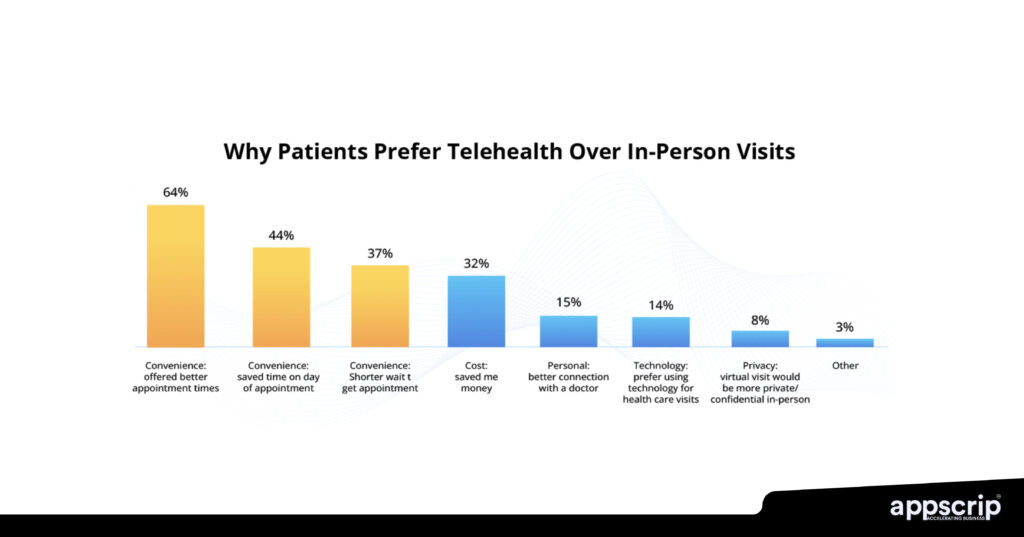
User Interface and Experience
It is imperative that telehealth platforms warrant ease of usage, or it could derail the therapeutic process and render it ineffective. The platform should be intuitive and stress-free so that both the therapists and clients are able to easily manoeuvre it.
- For Therapists:
- Streamlined dashboard for managing sessions, notes, and scheduling
- Quick access to client records and treatment history
- Quick and easy to setup, with an easy learning curve
- For Clients:
- Easy log-in process (without complex software installations)
- Reliable video/audio quality
- Clear and easy navigation for joining sessions, messaging, or completing forms
An intuitive interface that reduces the need for technical know-how, which helps clients stay engaged and let therapists focus on care rather than troubleshooting issues.
Integration Capabilities
Therapists often rely on multiple tools to manage their practice. A good telehealth platform should integrate easily with these tools to avoid duplication or errors.
- Practice Management Software: Integration with tools like SimplePractice, TherapyNotes, or TheraNest allow for:
- Automatic syncing of appointments and client records
- Unified billing and payment processing
- Centralized documentation and case notes
- Calendars & Notifications: Syncing with Google Calendar or Outlook ensures better scheduling, higher visibility and cuts no-shows.
- Insurance and EHR Systems: Platforms that connect with insurance verification tools or electronic health records simplify admin work and improve accuracy.
That is to say, strong integration capabilities lead to higher workflow efficiency, less manual data entry, and more time for clientcare.
Top Telehealth Platforms for Therapists in 2025
Platform 1: Doxy.me
Doxy.me is a HIPAA, GDPR, PHIPA, and HITECH-compliant telehealth platform that’s designed specifically for healthcare professionals. It operates easily within the browser, downloads are not required for either the therapist or the client. The interface is clean and user-friendly, ideal for therapists who want a low-barrier entry into teletherapy.
Key features include:
| Feature | Free Tier | Paid Tiers (Professional & Clinic) | Description |
| Video Sessions | Unlimited; basic quality | Enhanced HD video/audio | Conduct virtual sessions with varying video quality based on the plan. |
| Security | End-to-end encrypted | End-to-end encrypted | Ensures all communication is private and HIPAA-secure. |
| Waiting Room | Customizable with text/images/video | Branding and welcome messages | Personalize the virtual lobby to enhance client experience. |
| Client Access | No account needed; join via link | No account needed; join via link | Clients can enter sessions easily without sign-ups or apps. |
| Payments | Not included | Integrated Stripe payments | Accept session payments directly through the platform. |
| Group Calling | Not included | Available (Clinic plan) | Support for multiple participants in therapy sessions. |
| Installation | No downloads; browser-based | No downloads; browser-based | Fully web-based; works in modern browsers without installing apps. |
| Screen Sharing | Included | Included | Share documents, visuals, or notes in real time during sessions. |
| Invites | Text and email invites | Text and email invites | Send secure session links directly to clients for quick access. |
| BAA (HIPAA Compliance) | Not included | Included in all paid plans | Business Associate Agreement provided for HIPAA-compliant operations. |
| Browser Compatibility | Chrome, Firefox, Safari; all devices | Chrome, Firefox, Safari; all devices | Compatible across most major browsers and devices (desktop/mobile/tablet). |
| Client Queue Management | Not included | Available (Clinic plan) | Organize and prioritize waiting clients, especially in group practice settings. |
Platform 2: BetterHelp
BetterHelp is one of the largest online counseling platforms and an online therapy software for clinicians, connecting licensed therapists with clients seeking mental health support. It handles client acquisition, marketing, scheduling, and billing, allowing therapists to focus solely on delivering care.
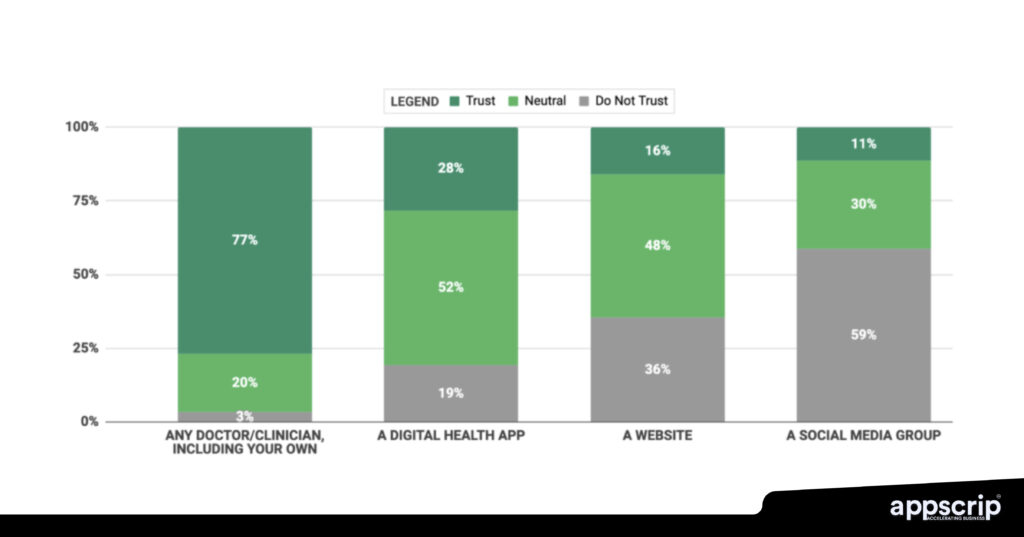
Degree of trust in sources of health information
How It Supports Therapists and Clients:
| Feature | How It Supports Clients | How It Supports Therapists |
| Client Matching System | Ensures clients are paired with therapists who suit their needs and preferences. | Matches therapists with clients based on expertise and availability, reducing outreach effort. |
| Flexible Scheduling | Allows clients to book sessions at convenient times. | Therapists choose their own hours and caseload, supporting part-time or full-time flexibility. |
| Unlimited Messaging | Clients can message their therapist anytime, encouraging consistent engagement. | Enables therapists to support clients between sessions through asynchronous communication. |
| Multiple Therapy Modalities | Offers video, phone, and chat sessions as per client comfort and accessibility. | Allows therapists to deliver care via different formats, switching seamlessly. |
| Mobile & Desktop Access | Accessible via app or browser, providing convenience and ease of use. | Enables therapists to conduct sessions from anywhere, increasing flexibility. |
| Financial Aid Options | Sliding scale pricing makes therapy more affordable and inclusive. | Expands the client base by attracting individuals who might not afford traditional therapy. |
| Secure Platform | All sessions are encrypted and HIPAA compliant, ensuring confidentiality. | Provides a safe, legally compliant environment for practicing therapy. |
| Therapist Dashboard | N/A | Centralizes scheduling, communication, and client management tools for easy access. |
| All-in-One Platform | Enables smooth transitions between different session types based on client needs. | Combines messaging, video, and phone tools in one place, streamlining service delivery. |
| No Downloads Required | Clients can access therapy with just a browser—no installation needed. | Reduces barriers to client participation, improving session attendance. |
| No Administrative Work | N/A | Platform handles billing, insurance, and marketing—therapists focus only on clinical work. |
| Large Client Base | Offers fast access to therapy without lengthy waitlists. | Connects therapists to thousands of potential clients globally. |
| Professional Support | N/A | Offers peer community, licensed supervisors, and ongoing webinars for clinical growth. |
| Licensing & Credentialing Help | N/A | Assists therapists during onboarding and compliance processes. |
Platform 3: Theranest
TheraNest is a practice management software customised for mental and behavioral health professionals, including solo practitioners, group practices, and agencies. It combines telehealth, scheduling, documentation, billing, and analytics in one platform. It is among the preferred teletherapy platforms for mental health professionals.
Unique offerings include:
| Feature Category | Description |
| Built-in Telehealth | HIPAA-compliant video sessions with screen sharing and group session capability. |
| Documentation Tools | Customizable therapy notes (SOAP, DAP, progress notes) with clinical documentation templates. |
| Integrated EHR System | Manage client records, treatment plans, and appointment history from one platform. |
| Insurance & Billing Support | Claim submissions via clearinghouses, invoice generation, and payment tracking. |
| Scheduler & Client Portal | Clients request appointments, fill intake forms, and view invoices securely. |
| Mobile Access | Accessible on desktop and mobile for documentation and communication on the go. |
| Outcomes Measurement Tools | Tools for tracking treatment progress, assessments, and effectiveness. |
Unique Offerings for Mental Health Professionals:
| Feature Category | Description |
| All-in-One Practice Management | Combines telehealth, scheduling, documentation, billing, and progress tracking in one platform. |
| Telehealth Video Integration | Browser-based, HIPAA-compliant video sessions with no extra software. |
| Customizable Note Templates | SOAP, DAP, progress notes, and treatment plans tailored for therapy. |
| Client Portal | Secure intake forms, appointment handling, and payment processing. |
| Billing & Insurance Claims | Built-in tools for invoices, payment processing, EDI, ERA, and eligibility checks. |
| Scheduling & Reminders | Automates appointment reminders via text, email, or phone. |
| Group & Couples Therapy | Supports multi-user sessions for families or groups. |
| Mobile App for Clinicians | Access to calendar, notes, and client info on mobile. |
| Outcome Measurement Tools | Includes standardized tools like PHQ-9, GAD-7 for progress tracking. |
| Integrated E-prescribing | Optional feature to prescribe medication through partner platforms. |
| Reporting & Analytics | Dashboards for financial, client, and operational insights. |
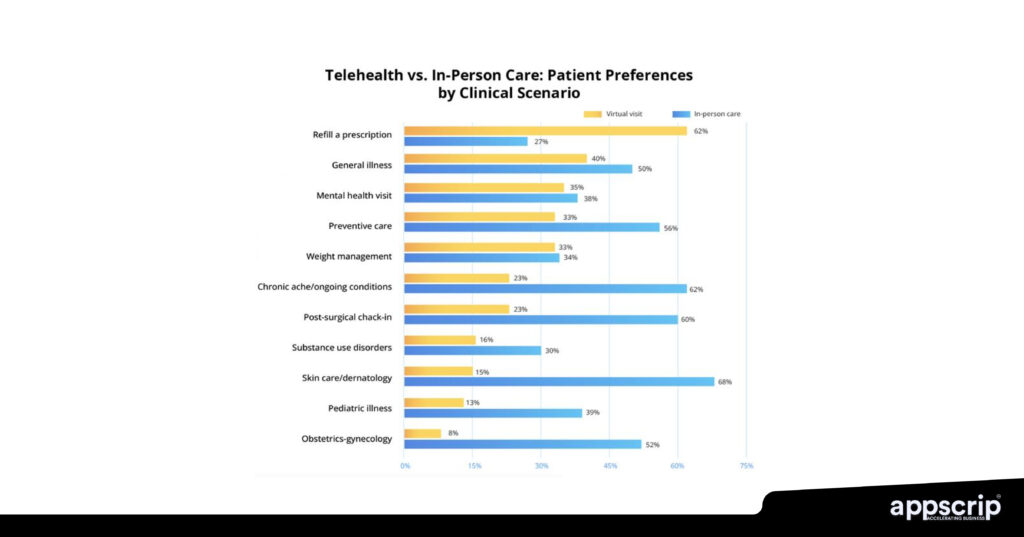
Comparing Telehealth Platforms
Cost and Pricing Models
| Platform | Pricing Structure | Free Tier Available | Affordability for Therapists |
| Doxy.me | – Free tier with basic features | ✅ Yes | Very affordable for solo practitioners. Free tier is robust. Paid tiers scale well for growing practices. |
| – Professional: ~$35/month | |||
| – Clinic: Custom pricing (for organizations) | |||
| BetterHelp | Therapists are paid per hour (~$30–$70/hour based on engagement); therapists do not pay to use the platform | ❌ No | No direct cost to therapists; however, therapists earn less per hour compared to private practice rates. |
| TheraNest | Starts at $39/month for up to 30 clients | ❌ No | Reasonably priced for solo and group practices; scalable and includes full EHR and billing functionality. |
| + Additional costs for telehealth ($12/month per provider) | |||
| Custom pricing for agencies |
Customer Support and Training
| Platform | Support Channels | Training & Resources Offered | Strength of Support |
| Doxy.me | Email support, Help Center | Extensive online documentation, video tutorials | Good for self-starters; limited live support. |
| BetterHelp | Email and in-platform messaging | Onboarding for new therapists, therapist community support | Strong clinical support and onboarding for therapists. |
| Therapist Success Team | |||
| TheraNest | Phone, Email, Live Chat | 1:1 onboarding sessions, webinars, video tutorials, Help Center | Comprehensive support with real-time help available. |
How to Choose the Right Platform for Your Practice
Assessing Your Needs
When selecting a telehealth platform, it’s essential to align your choice with your practice’s structure, volume, and client preferences. Below is a breakdown of the key factors to evaluate:
| Factor | Considerations for Solo Practitioners | Considerations for Group Practices/Clinics |
| Client Volume | Lower client load—free or basic paid plans may suffice. | High client load—look for platforms with scalable pricing and team management. |
| Demographics | Older clients may prefer simple login processes (like Doxy.me). | Mixed-age groups may benefit from multi-device support and portals (TheraNest). |
| Younger clients may appreciate app access (like BetterHelp). | ||
| Administrative Needs | May not need advanced scheduling or billing tools. | Require EHR integration, billing, insurance processing (TheraNest). |
| Marketing & Client Sourcing | Must market independently (Doxy.me, TheraNest). | Prefer client-matching services (BetterHelp handles marketing for therapists). |
| Technology Comfort Level | Choose platforms with simple, intuitive interfaces. | Look for platforms offering onboarding, robust support, and staff training. |
| Type of Therapy Offered | For individuals or couples, any platform may work. | Group, family, or organizational sessions require group video and collaborative tools. |
| For group therapy, ensure platform supports multiple attendees (Doxy.me, Theranest). |
Trial and Feedback
Trial periods and early feedback are critical to ensure the platform aligns with both your workflow and your clients’ comfort levels.
| Key Element | Why It Matters |
| Free Trial / Freemium | Allows you to explore features without commitment (e.g., Doxy.me offers a free tier). |
| Client Feedback | Clients’ experience with video quality, login ease, and communication tools is crucial for long-term engagement. |
| Therapist Usability | Test session setup, documentation speed, scheduling tools, and billing integration. |
| Flexibility | Choose platforms that allow month-to-month payments, in case switching is needed. |
| Evaluate Over Time | Run a 2–4 week trial with a few clients to understand platform fit and stability. |
| Integration Compatibility | Ensure it integrates well with existing tools like calendars, EHRs, or payment systems (especially relevant for TheraNest). |
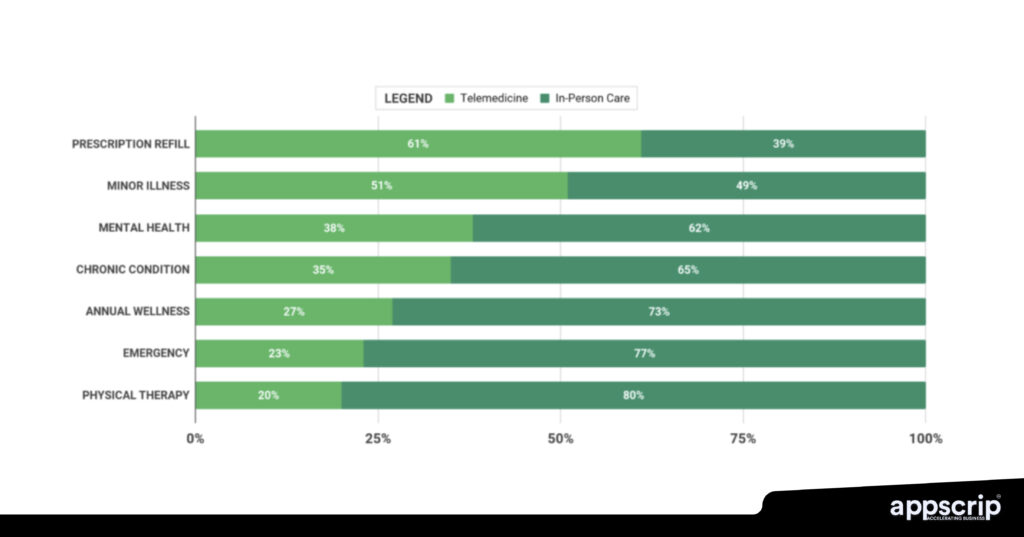
Preference for Telemedicine vs In-person care
Conclusion: Telehealth Platform For Therapists
Selecting the right telehealth platform depends on your practice, administrative needs, and client preferences. Doxy.me, BetterHelp, and Theranest each bring unique strengths to the table, from affordability to robust support and full-featured management systems.
By embracing the right technology, therapists can improve client outcomes, streamline operations, and build stronger therapeutic relationships—even at a distance.
For those seeking a customized, scalable telehealth solution tailored to specific business needs, consider working with Appscrip’s telehealth app developers. Their expertise in building HIPAA-compliant platforms ensures your practice is well-equipped to thrive in the evolving landscape of digital mental healthcare.





